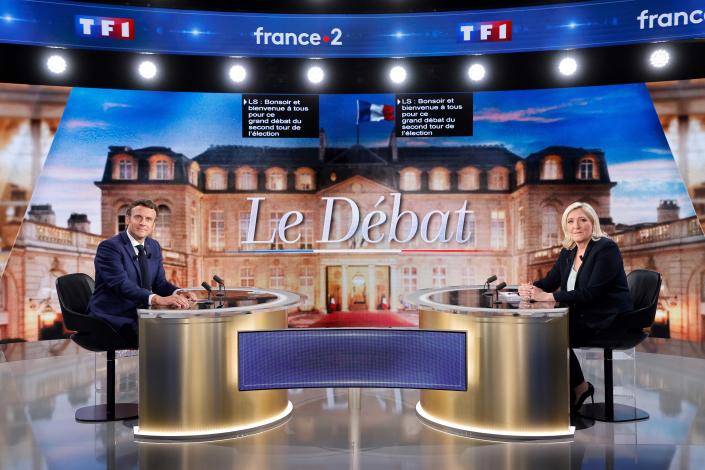When President Emmanuel Macron and Marine Le Pen faced off in a heated debate this week ahead of Sunday’s election, it wasn’t just millions of TV viewers at home in France watching closely.
Also paying attention were the 450 million citizens of the European Union and governments from Washington to Kyiv, for whom this election could have seismic implications.
Making her third bid for power, the far-right nationalist Le Pen has never been closer to becoming the first woman to occupy the Élysée Palace, the official residence of French presidents since 1848.
It’s an outcome that seemed unthinkable until recently and would send shockwaves across the West, handing Russian President Vladimir Putin a major victory in his campaign to recast the balance of power in Europe even as his military struggles on the ground in Ukraine.
Macron, seeking his second term, is a former banker and liberal centrist who burst onto the global stage five years ago with a new political party. He swept to power with grand ambitions, sidelining the traditional powerhouses on the center-right and center-left and seeking to position Paris as a European leader in the Western alliance, but has seen his tenure beset by domestic criticism, the pandemic and now a major war on the continent.
He may be leading in the polls, but his technocratic, aloof style is far from universally popular. One woman told the president at a campaign event Thursday that Sunday’s election, to her, amounted to choosing between “plague and cholera.”
Opinion polls since the pair advanced from the first round this month have shown Macron pulling ahead by around 10 percentage points, at 55 percent. But that’s far closer than when the two last contested the presidency in 2017.
A fierce nationalist and Eurosceptic, Le Pen aims to drastically shift France’s place in the European family of nations by ending its senior leadership in NATO, reducing payments and legal deference to the E.U., restricting non-French people’s access to social benefits and advocating a radical rapprochement with Putin.
As the campaign reaches its conclusion, analysts and diplomats are anxiously weighing what the result could mean for the war in Ukraine and the future of NATO.


From Paris to Putin
As war rages in eastern Ukraine, Europe has to contemplate the unthinkable: a pro-Putin leader of a major European nation who, experts fear, could weaken the Western alliance just when it has assumed new relevance.
A standout moment from Wednesday’s debate was Macron highlighting Le Pen’s links to Russia and her admiration for Putin. In 2014 her party took out a loan of 9 million euros (about $12 million) from the First Czech Russian Bank, which allegedly has links to the Kremlin.
“You talk about your banker when you talk about Russia, that’s the problem,” Macron told his opponent. “You depend on Russian power, you depend on Mr. Putin.”
Le Pen said in response that she was “a completely free and independent woman” and that no French bank would lend to her. Nevertheless she told a BBC interviewer in 2017 that her policies “are the policies represented by Mr. Trump, they’re represented by Mr. Putin.” While many of France’s allies accuse Putin’s forces of committing genocide and look to make his regime a pariah, Le Pen is proposing a NATO-Russia summit as soon as the war is over.
“For sure she has sympathies with Putin,” said Marie Jourdain, a visiting fellow at the Atlantic Council think tank and previously a senior figure in the French Ministry of Defense. “Since the outbreak of war she has been careful not to support Putin. But she says that when the war is over she would have NATO-Russia rapprochement as if nothing has happened.”
In stark contrast to Macron’s establishment credentials, Le Pen’s flagship foreign policy goal is to take France out of the NATO Integrated Strategic Command — a long-held promise that would end the country’s senior leadership role within the alliance. Charles de Gaulle did this in 1966, and it took until 2009 for France to rejoin.
France would still be bound by NATO’s Article 5, which guarantees a shared military response if any member is attacked.
Russia’s distrust of NATO is a principal driving factor in the current crisis: One of Putin’s demands before the war was that Ukraine rule out joining indefinitely. (President Volodymyr Zelenskyy has since said Ukraine will not join anytime soon.)
And because France would retain a veto over new NATO members, a newly skeptical and Moscow-friendly Paris could thwart Sweden and Finland’s mooted ambitions to join.
“As things stand it’s hard to imagine any member state saying no [to new NATO members], but if Le Pen comes in?” Jourdain said. “It might not be so difficult for her to say, ‘Well, I’m not going to ratify that.’ She might want to get back into dialogue with Putin, rather than provoke him further.”
Le Pen would also reduce payments to the bloc and undermine the principle that member states give E.U. laws primacy — another potential bonus for Russia that suspiciously eyes the E.U.’s military and geographic expansion.


Macron, meanwhile, has presented himself as a major international statesman, both before and during the war — but he has not been short of critics at home or abroad for what some see as his own appeasement of the Kremlin.
The French leader has spoken to Putin more than a dozen times in the past four months, including a five-hour meeting in Moscow on Feb. 7, establishing himself as the West’s de facto negotiator with Russia as the United States and others cut contact and warned that Russia was amassing forces for an imminent invasion. He has also distanced himself from President Joe Biden’s more robust accusations of Russian war crimes.
Nonetheless, Ian Bond, a senior British diplomat for almost 30 years who is now director of foreign policy at the Centre for European Reform think tank, said a Le Pen win could mean the end of France’s historical trans-Atlantic defense role.
“The French were quite often quite difficult in NATO discussions,” he said.
“But where the French didn’t go was to suggest, ‘Actually the Soviet Union isn’t that dangerous, is it?’ They accepted the case that the Soviet Union was the big problem that we had to face. And if Le Pen doesn’t accept that that is true of Russia, then that is problematic.”
The result could be an end to French military aid to Ukraine, both Bond and Jourdian said, as well as a major roadblock to more severe sanctions on Moscow.


Has Macron left it too late?
For all the ways this election could affect the course of the war and its aftermath, Russia and Ukraine have largely played second fiddle in the campaign to domestic issues.
Macron, now 44, was elected France’s youngest president in 2017 but has been repeatedly dogged by accusations that he is part of a detached, technocratic elite.
One of his central campaign pledges, to increase the retirement age from 62 to 65, is unpopular and opposed by a majority of the country. He is disliked by many of the 7.7 million voters who backed the left-wing firebrand Jean-Luc Mélenchon in the first-round, leading Macron to woo left-leaning voters and ethnic minorities in the campaign’s final week.
“Macron is doing better in the polls, but the big question is what will Mélenchon voters do,” Jourdain said. “They might not like Le Pen so much, but they might not vote at all. This is why the campaigns now are focused so much on climate change and on social justice.”
Le Pen has won support by talking about the rising cost of living, as raised by the “Gilet Jaunes” movement in 2019 — including among voters who would normally shun a far-right candidate.
“Marine Le Pen talks about young people’s economic situation,” said Enzo Alias, national deputy for the Young People With Marine campaign group. He also praised Le Pen’s strident anti-European stance.
“The France we love is a France that’s more sovereign, that has control over its destiny,” said Alias.
But Le Pen’s domestic program — she proposes banning Muslim face and head coverings in public and radical changes to the rights of immigrants compared to French citizens — could have effects far beyond France.
In a column published Thursday in several European newspapers, German Chancellor Olaf Scholz, Spanish Prime Minister Pedro Sánchez and Portuguese Prime Minister António Costa wrote that Sunday’s vote is “critical for France and all and every one of us in Europe.”
“It’s the election between a democratic candidate who believes that France’s strength broadens in a powerful and autonomous European Union and an extreme-right candidate who openly sides with those who attack our freedom and democracy,” they wrote.
The West will have its eyes on Paris this weekend, and so will Putin.




